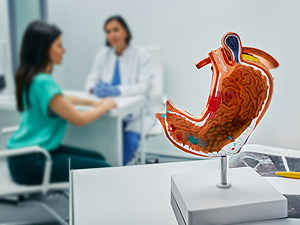Inflammatory Bowel Disease
Inflammatory bowel disease (IBD) is a recurring and long-term (chronic) condition that affects your digestive tract. IBD causes inflammation of the stomach, small intestine, and colon. IBD is not to be confused with irritable bowel syndrome (IBS) which may have some similar symptoms, but does not cause damage to the digestive tract. IBD is a progressive disease that can become worse over time and cause other damage if not properly diagnosed and treated. There are two types of IBD: Crohn’s disease and ulcerative colitis.
- Ulcerative colitis: causes inflammation in the large intestine or colon. This form of IBD inflames the innermost lining of the colon and creates tiny open sores (ulcers).
- Crohn's disease: leads to inflammation anywhere in the gastrointestinal tract, from mouth to anus. However, it commonly affects the end of the small intestine (the ileum) and the beginning of the large intestine (right colon). Crohn’s disease can also affect the entire thickness or alternating areas of the bowel wall.
Crohn’s disease and ulcerative colitis are complex digestive tract disorders that require treatment. If left untreated, they can cause problems throughout the body such as anemia, arthritis, abdominal pain, liver inflammation, eye inflammation, and osteoporosis.
Please contact us at 516-961-4545 to schedule an appointment.
IBD tends to be the result of a combination of conditions. The inflammation of your digestive tract may be due to your family medical history (genetics), your body’s reaction a perceived invasion (immunology), and environmental issues, such as bacteria, or an injury. While the exact cause is difficult to pinpoint, we do know that early treatment can minimize the effects of the disease.
Symptoms
Although Crohn's disease and ulcerative colitis are different conditions, IBD conditions have similar symptoms, such as:
- Diarrhea
- Fatigue
- Abdominal pain and cramping
- Blood in your stool
- Reduced appetite
- Unintended weight loss
It’s important to find out if you have IBD through diagnosis by one of our specialists.
Living with IBD
Finding out that you have IBD can be the start of a positive path toward controlling the symptoms of the disease. However, there along with any condition, there may come an emotional reaction to having a condition. Living with IBD can be a challenge. Flares of symptoms may be disabling physically and emotionally. We can help you with both aspects of living with IBD to help you maintain a good quality of life.
Learn More
Bariatric Endoscopy
Hepatology/Liver Diseases
Inflammatory Bowel Disease
General Gastroenterology
Motility Program
Colon Cancer Screening
Pancreas Cyst Clinic
Gastrointestinal (GI) Endoscopy Unit
Liver and Bile Duct Surgery Program
Pancreatic Surgery Program
Cancer Treatment & Oncology Care

Bariatric Endoscopy
Over 40% of adults across all ages and genders struggle with obesity....
Read More

Hepatology/Liver Diseases
At Mount Sinai South Nassau, our liver specialists or hepatologists have been at the forefront of groundbreaking...
Read More

Inflammatory Bowel Disease
Inflammatory bowel disease (IBD) is a recurring and long-term (chronic) condition that affects your digestive tract...
Read More

General Gastroenterology
We understand how much your digestive health impacts your quality of life...
Read More

Motility Program
The Mount Sinai South Nassau Gastrointestinal Motility Program is led by a team of gastroenterologists...
Read More

Colon Cancer Screening
Screening for colorectal cancer screening is strongly recommended for everyone, starting at age 45...
Read More

Pancreas Cyst Clinic
The Pancreas Clinic at Mount Sinai South Nassau offers extensive, specialized expertise in diagnosing...
Read More